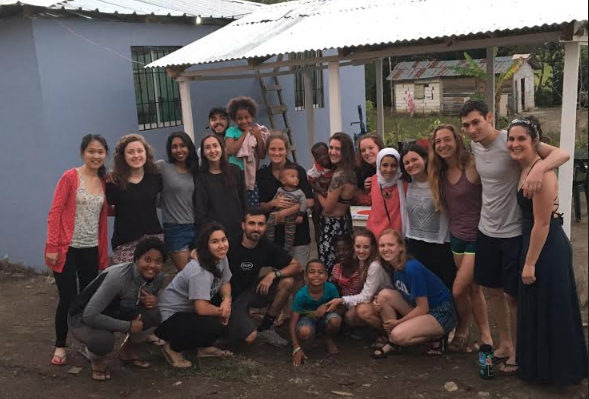By Charlotte Fall
Over spring break, students from Northeastern traveled to Puerto Plata in the Dominican Republic to work with Project Esperanza – an organization that serves the Haitian refugee population through education, social aid, and community development. This population migrated to Puerto Plata in search of opportunities to help lift them out of the cyclical poverty they faced in Haiti, only to be confronted with a new cycle of discrimination and a life of statelessness.
Originally, the constitution of the Dominican Republic granted citizenship to anyone born on Dominican soil, but in 2013 the constitution was rewritten to exclude those born to undocumented immigrants. The new constitution also revoked the citizenships of all children born from undocumented immigrants dating back to 1929, causing as many as ~250,000 Dominicans of Haitian descent to become stateless. This issue has made it nearly impossible for Haitians to receive forms of documentation from the government, which almost completely eliminates the possibility of finding employment from any decent paying job, such as at resort hotels (a major industry in the Dominican).
The Haitian refugees live mainly in bateyes – old sugarcane plantations that have been deserted due to the migration and advancement of the sugar market. These communities are slum villages poor, run-down conditions mean that people live in horrendous conditions — lacking proper shelter, sanitation, and access to clean drinking water. Most homes are constructed by sheets of aluminum, cardboard, and other scrap materials, that squeeze entire families in tiny areas ranging from 10-20 square feet.
Project Esperanza was started in 2005 by two Virginia Tech students to bring aid to the Dominican Republic. They initiated their efforts through fundraisers and volunteer trips, until they were able to permanently acquire land to maintain a long-term presence in the community. Project Esperanza has started multiple grassroots schools to increase education accessibility in the community. Our group was fortunate enough to meet many of the young students and it was inspiring to witness their level of intelligence. Most of them are able to speak Creole and Spanish fluently, and are learning English and French at an astounding pace. Coming from the United States, where speaking English only is commonplace, I viewed their achievement in language as a symbol of the unharnessed potential of the Haitian refugees.
One of the main interests our group focused on was surveying the community on their opinions and experiences with microfinance institutions. Microfinance is often used as a female empowerment tool that uses banking practices (including loans, savings, and insurance) to alleviate extreme poverty. We were shocked at the number of women that had already taken out loans through microfinance programs in Puerto Plata, but concluded that there was need for significant improvement and increased scale of the programs in order to have the desired effect. Unfortunately, microfinance institutions too often implement unethically high interest rates for their loans because their borrowers have little financial education and do not understand that they are being scammed until they are too deep in a cycle of debt.
 As a student from an upper-middle class background, I had never witnessed this type of extreme, seemingly unsolvable, poverty. It was unbelievable to see the conditions and lack of opportunities that people live with and often, I was left feeling utterly hopeless for those living in the bateyes. As a group, we worked to reflect on our experiences in the DR and challenged ourselves to leave Puerto Plata with refreshed mindsets and gratitude for our futures back in the United States. We realized that it is important to acknowledge the opportunities life has given us, and not to feel guilt for our status in the world, as long as we use our privilege to create opportunities for others. We acknowledged the power of hope, and that if members of the Haitian refugees could maintain hope, then we could as well.
As a student from an upper-middle class background, I had never witnessed this type of extreme, seemingly unsolvable, poverty. It was unbelievable to see the conditions and lack of opportunities that people live with and often, I was left feeling utterly hopeless for those living in the bateyes. As a group, we worked to reflect on our experiences in the DR and challenged ourselves to leave Puerto Plata with refreshed mindsets and gratitude for our futures back in the United States. We realized that it is important to acknowledge the opportunities life has given us, and not to feel guilt for our status in the world, as long as we use our privilege to create opportunities for others. We acknowledged the power of hope, and that if members of the Haitian refugees could maintain hope, then we could as well.
There is no easy solution to the Haitian refugee crisis in the Dominican Republic, but raising awareness of their conditions and creating any amount of opportunity for these stateless migrants is a start towards alleviating their cycle of poverty.


